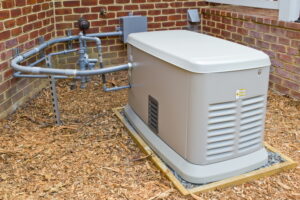 As most homeowners are aware, portable generators are relatively convenient, but can be a hassle and also present a bit of a safety risk. They run on gasoline and release large amounts of carbon monoxide (and so should never be used in an enclosed space such as your garage). They can also be prohibitively inefficient when you consider the cost of fuel. Plus, the generator itself is not exactly cheap for a low return on investment.
As most homeowners are aware, portable generators are relatively convenient, but can be a hassle and also present a bit of a safety risk. They run on gasoline and release large amounts of carbon monoxide (and so should never be used in an enclosed space such as your garage). They can also be prohibitively inefficient when you consider the cost of fuel. Plus, the generator itself is not exactly cheap for a low return on investment.
But we’re not really here to talk about everything wrong with a portable system. Rather, we want to talk about what’s right with a whole-house generator! There are a number of great benefits to using a whole house generator, which we’ll get into below. Read on!
Whole House Generators: The Advantages
Portable systems can be great for certain purposes. For instance, many people use them on camping trips to heat up cookware and whatnot. But whole-house generators are the way to go if you really want your home to be protected in the case of a widespread power outage, particularly in the middle of winter!
Whole-house generators are considered standby generators and hook up to your home’s electrical system while being powered by natural gas that comes from the city’s gas line. This means that the system automatically turns on when the power goes out, and because it’s powered by natural gas, it operates very efficiently. All of this gives you the following advantages:
The Convenience of Standby
With a standby generator, you’ll never have to worry about needing to wheel out a generator and fill it with fuel if you have a power outage. This is particularly helpful if it’s late at night and you need your heater, and/or if it’s bad weather outside and you keep your portable generator out in a shed or the garage. (Remember, don’t ever run a portable system in an enclosed space like this!)
Automatic standby generators switch on as soon as they detect an interruption in the flow of electricity and cycle back off when the electricity comes back on.
The Efficiency of a Whole-House System
Gasoline or oil that you could buy for a portable generator is a bit costly, and not a highly efficient fuel source. This is why a standby whole house generator runs on natural gas—it creates plenty of electricity for a low cost.
Whole-House Generators Are Safe
Portable standby generators are much easier to operate than portable generators. Portable generators, again, run on gasoline, and this releases hazardous fumes such as carbon monoxide into the air. Too much of this can be a major health hazard. Natural gas is cleaner-burning and can be operated right outside your home with no risk.
Maintaining Your Generator
Whole-house generators are great, but remember, just like any other major appliance, they need to be properly and professionally maintained. If it’s been a year since your last generator tune-up, it’s time to give our team a call!
Contact Comfort Flow Heating for professional electrical services in Springfield, OR.
